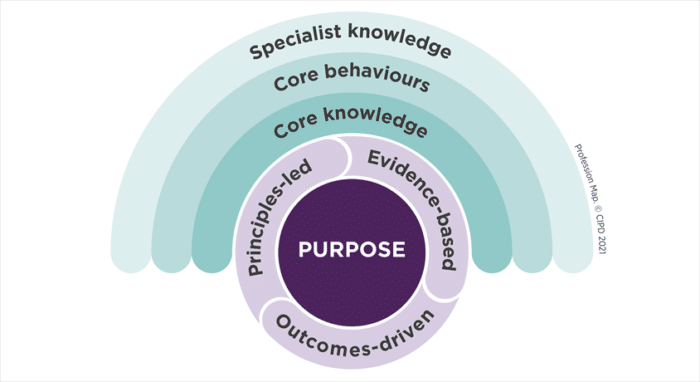A HR specialist should have the knowledge, training, and skills necessary to perform their duties effectively. Professionalism in human resources results from formal education and hands-on experience in people management, as well as a demonstrated commitment to and track record of success in maintaining an impeccable reputation inside the organization. The CIPD (2020) website states that HR professionals should have a firm grasp on the fundamentals of strategic HR management in order to better serve their organizations and help them accomplish their objectives. The CIPD’s 2018 profession map offers an insightful characterization of HR professionalism by outlining the essential qualities and traits of an effective HR expert (Profession map: CIPD Profession map, 2022). The standards of the people profession are formalised in the Profession Map. Hence, People professionals can use the map as a guide to make better choices, take bolder actions, achieve greater results, effect positive change within their organization, and advance in their chosen field (Peters, 2022).

The map flows from core purpose, and core values of people professionals. According to (Profession map: CIPD Profession map, 2022) the core purpose of people professionals is to advocate for enhanced workplace conditions and worker satisfaction. The three core values include decisions, actions and behaviours that are principle-led, evidence-based and outcome-driven.
The map then lays out the core knowledge, core behaviours and specialist knowledge for people professionals. In this case, the map offers transparency and clarity identifying the abilities, knowledge and skills required for each role at every grade level.
Core Knowledge
The professional map identifies six fundamental knowledge domains that are essential for driving change, adding value, and having a positive influence on the workplace. These core knowledge areas include People practice, culture, and behaviour, business acumen, Evidence-based practice, Technology and people and change (Profession map: CIPD Profession map, 2022). The theory supporting the people profession can be summed up in the fundamental knowledge domains, which are based on the most recent research and insights. It lays out what a practitioner in the people professions, regardless of function, industry, or specialty, has to know in order to be effective.
Core Behaviour
A solid basis for sound decision-making is provided by core behaviour domains. The CIPD profession map identifies eight key behaviours that enable people professionals to generate value for clients, employers, communities, and the profession itself. These areas include ethical practice, professional courage and influence, valuing people, working inclusively, commercial drive, passion for learning, insights focused, and situational decision-making (Profession map: CIPD Profession map, 2022). People professionals can always rely on the same set of core behaviours to guide their thinking and actions, no matter how novel or difficult the circumstances.
Specialist Knowledge
Experts in people profession can learn from the specific knowledge areas how to best put their skills to use in the workplace. Specialists’ knowledge covers at least nine areas including learning and development, organisation development and design, people analytics, resourcing, rewards and talent management, diversity and inclusion, employee relations, and experience (Profession map: CIPD Profession map, 2022).




